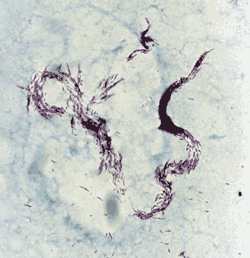
(MTB PCR, Mycobacterium tuberculosis complex PCR)
Although an acid fast smear (AF smear) can provide an important clue to the nature of the causative agent for a patient's disease, a positive result does not necessarily indicate the presence of M. tuberculosis complex (MTBC). The presence of AF Bacillis (AFBs) in clinical specimens can be simply due to the growth of common water contaminants such as M. chelonae and M. fortuitum. On the other hand, a negative smear result also does not rule out the presence of M. tuberculosis complex at low pathogen load. Recent developments in PCR based amplification and detection of organism specific DNA offers an alternative that can be more specific and sensitive than a smear test.
For an accurate detection of the presence of MTBC in clinical specimens, the UWMC Molecular Diagnosis Section utilizes a nested PCR protocol that targets heat shock protein 65 gene (hsp65). Utilization of species-specific fluorescent probes on a real-time PCR platform facilitates rapid and highly sensitive detection of M. tuberculosis complex-specific DNA in clinical specimens.
In many specimens acid fast bacilli can be seen microscopy of tissue sections but are very difficult to grow due to their fastidious nature, or are not viable as a result of antimicrobial therapy. Some specimens may never reveal the presence of a pathogen because of low abundance and/or lack of viability. The use of PCR to detect this DNA extracted directly from clinical specimens facilitates the identification of these pathogens.
For interesting cases emplyoying this test methodology, please see our Clinical Significance page.